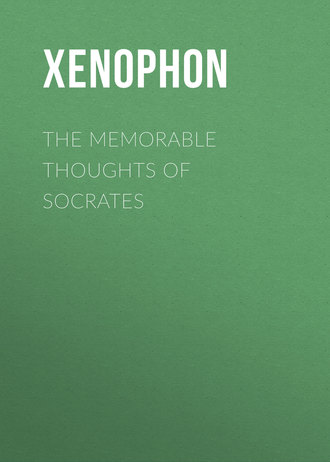 полная версия
полная версияThe Memorable Thoughts of Socrates

Xenophon
The Memorable Thoughts of Socrates
Introduction
This translation of Xenophon’s “Memorabilia of Socrates” was first published in 1712, and is here printed from the revised edition of 1722. Its author was Edward Bysshe, who had produced in 1702 “The Art of English Poetry,” a well-known work that was near its fifth edition when its author published his translation of the “Memorabilia.” This was a translation that remained in good repute. There was another edition of it in 1758. Bysshe translated the title of the book into “The Memorable Things of Socrates.” I have changed “Things” into “Thoughts,” for whether they be sayings or doings, the words and deeds of a wise man are alike expressions of his thought.
Xenophon is said to have been, when young, a pupil of Socrates. Two authorities have recorded that in the flight from the battle of Delium in the year b.c. 424, when Xenophon fell from his horse, Socrates picked him up and carried him on his back for a considerable distance. The time of Xenophon’s death is not known, but he was alive sixty-seven years after the battle of Delium.
When Cyrus the Younger was preparing war against his brother Artaxerxes Mnemon, King of Persia, Xenophon went with him. After the death of Cyrus on the plains of Cunaxa, the barbarian auxiliaries fled, and the Greeks were left to return as they could from the far region between the Tigris and Euphrates. Xenophon had to take part in the conduct of the retreat, and tells the story of it in his “Anabasis,” a history of the expedition of the younger Cyrus and of the retreat of the Greeks. His return into Greece was in the year of the death of Socrates, b.c. 399, but his association was now with the Spartans, with whom he fought, b.c. 394, at Coroneia. Afterwards he settled, and lived for about twenty years, at Scillus in Eleia with his wife and children. At Scillus he wrote probably his “Anabasis” and some other of his books. At last he was driven out by the Eleans. In the battle of Mantineia the Spartans and Athenians fought as allies, and Xenophon’s two sons were in the battle; he had sent them to Athens as fellow-combatants from Sparta. His banishment from Athens was repealed by change of times, but it does not appear that he returned to Athens. He is said to have lived, and perhaps died, at Corinth, after he had been driven from his home at Scillus.
Xenophon was a philosophic man of action. He could make his value felt in a council of war, take part in battle—one of his books is on the duties of a commander of cavalry—and show himself good sportsman in the hunting-field. He wrote a book upon the horse; a treatise also upon dogs and hunting. He believed in God, thought earnestly about social and political duties, and preferred Spartan institutions to those of Athens. He wrote a life of his friend Agesilaus II., King of Sparta. He found exercise for his energetic mind in writing many books. In writing he was clear and to the point; his practical mind made his work interesting. His “Anabasis” is a true story as delightful as a fiction; his “Cyropædia” is a fiction full of truths. He wrote “Hellenica,” that carried on the history of Greece from the point at which Thucydides closed his history until the battle of Mantineia. He wrote a dialogue between Hiero and Simonides upon the position of a king, and dealt with the administration of the little realm of a man’s household in his “Œconomicus,” a dialogue between Socrates and Critobulus, which includes the praise of agriculture. He wrote also, like Plato, a symposium, in which philosophers over their wine reason of love and friendship, and he paints the character of Socrates.
But his best memorial of his old guide, philosopher, and friend is this work, in which Xenophon brought together in simple and direct form the views of life that had been made clear to himself by the teaching of Socrates. Xenophon is throughout opposing a plain tale to the false accusations against Socrates. He does not idealise, but he feels strongly, and he shows clearly the worth of the wisdom that touches at every point the actual conduct of the lives of men.
H. M.
Book I
Chapter I. Socrates Not a Contemner of the Gods of His Country, nor an Introducer of New Ones
I have often wondered by what show of argument the accusers of Socrates could persuade the Athenians he had forfeited his life to the State. For though the crimes laid unto his charge were indeed great—“That he did not acknowledge the gods of the Republic; that he introduced new ones”—and, farther, “had debauched the youth;” yet none of these could, in the least, be proved against him.
For, as to the first, “That he did not worship the deities which the Republic adored,” how could this be made out against him, since, instead of paying no homage to the gods of his country, he was frequently seen to assist in sacrificing to them, both in his own family and in the public temples?—perpetually worshipping them in the most public, solemn, and religious manner.
What, in my opinion, gave his accusers a specious pretext for alleging against him that he introduced new deities was this—that he had frequently declared in public he had received counsel from a divine voice, which he called his Demon. But this was no proof at all of the matter. All that Socrates advanced about his demon was no more than what is daily advanced by those who believe in and practise divination; and if Socrates, because he said he received intelligence from his genius, must be accused of introducing new divinities, so also must they; for is it not certain that those who believe in divination, and practise that belief, do observe the flight of birds, consult the entrails of victims, and remark even unexpected words and accidental occurrences? But they do not, therefore, believe that either the birds whose flight they observe or the persons they meet accidentally know either their good or ill fortune—neither did Socrates—they only believe that the gods make use of these things to presage the future; and such, too, was the belief of Socrates. The vulgar, indeed, imagine it to be the very birds and things which present themselves to them that excite them to what is good for them, or make them avoid what may hurt them; but, as for Socrates, he freely owned that a demon was his monitor; and he frequently told his friends beforehand what they should do, or not do, according to the instructions he had received from his demon; and they who believed him, and followed his advice, always found advantage by it; as, on the contrary, they who neglected his admonitions, never failed to repent their incredulity. Now, it cannot be denied but that he ought to have taken care not to pass with his friends either for a liar or a visionary; and yet how could he avoid incurring that censure if the events had not justified the truth of the things he pretended were revealed to him? It is, therefore, manifest that he would not have spoken of things to come if he had not believed he said true; but how could he believe he said true, unless he believed that the gods, who alone ought to be trusted for the knowledge of things to come, gave him notice of them? and, if he believed they did so, how can it be said that he acknowledged no gods?
He likewise advised his friends to do, in the best manner they could, the things that of necessity they were to do; but, as to those whose events were doubtful, he sent them to the oracles to know whether they should engage in them or not. And he thought that they who design to govern with success their families or whole cities had great need of receiving instructions by the help of divinations; for though he indeed held that every man may make choice of the condition of life in which he desires to live, and that, by his industry, he may render himself excellent in it, whether he apply himself to architecture or to agriculture, whether he throw himself into politics or economy, whether he engage himself in the public revenues or in the army, yet that in all these things the gods have reserved to themselves the most important events, into which men of themselves can in no wise penetrate. Thus he who makes a fine plantation of trees, knows not who shall gather the fruit; he who builds a house cannot tell who shall inhabit it; a general is not certain that he shall be successful in his command, nor a Minister of State in his ministry; he who marries a beautiful woman in hopes of being happy with her knows not but that even she herself may be the cause of all his uneasinesses; and he who enters into a grand alliance is uncertain whether they with whom he allies himself will not at length be the cause of his ruin. This made him frequently say that it is a great folly to imagine there is not a Divine Providence that presides over these things, and that they can in the least depend on human prudence. He likewise held it to be a weakness to importune the gods with questions which we may resolve ourselves; as if we should ask them whether it be better to take a coachman who knows how to drive than one who knows nothing of the matter? whether it be more eligible to take an experienced pilot than one that is ignorant? In a word, he counted it a kind of impiety to consult the oracles concerning what might be numbered or weighed, because we ought to learn the things which the gods have been pleased to capacitate us to know; but that we ought to have recourse to the oracles to be instructed in those that surpass our knowledge, because the gods are wont to discover them to such men as have rendered them propitious to themselves.
Socrates stayed seldom at home. In the morning he went to the places appointed for walking and public exercises. He never failed to be at the hall, or courts of justice, at the usual hour of assembling there, and the rest of the day he was at the places where the greatest companies generally met. There it was that he discoursed for the most part, and whoever would hear him easily might; and yet no man ever observed the least impiety either in his actions or his words. Nor did he amuse himself to reason of the secrets of nature, or to search into the manner of the creation of what the sophists call the world, nor to dive into the cause of the motions of the celestial bodies. On the contrary, he exposed the folly of such as give themselves up to these contemplations; and he asked whether it was, after having acquired a perfect knowledge of human things, that they undertook to search into the divine, or if they thought themselves very wise in neglecting what concerned them to employ themselves in things above them? He was astonished likewise that they did not see it was impossible for men to comprehend anything of all those wonders, seeing they who have the reputation of being most knowing in them are of quite different opinions, and can agree no better than so many fools and madmen; for as some of these are not afraid of the most dangerous and frightful accidents, while others are in dread of what is not to be feared, so, too, among those philosophers, some are of opinion that there is no action but what may be done in public, nor word that may not freely be spoken before the whole world, while others, on the contrary, believe that we ought to avoid the conversation of men and keep in a perpetual solitude. Some have despised the temples and the altars, and have taught not to honour the gods, while others have been so superstitious as to worship wood, stones, and irrational creatures. And as to the knowledge of natural things, some have confessed but one only being; others have admitted an infinite number: some have believed that all things are in a perpetual motion; others that nothing moves: some have held the world to be full of continual generations and corruptions; others maintain that nothing is engendered or destroyed. He said besides that he should be glad to know of those persons whether they were in hopes one day to put in practice what they learned, as men who know an art may practise it when they please either for their own advantage or for the service of their friends; or whether they did imagine that, after they found out the causes of all things that happen, they should be able to cause winds and rains, and to dispose the times and seasons as they had occasion for them; or whether they contented themselves with the bare knowledge without expecting any farther advantage.
This was what he said of those who delight in such studies. As for his part, he meditated chiefly on what is useful and proper for man, and took delight to argue of piety and impiety, of honesty and dishonesty, of justice and injustice, of wisdom and folly, of courage and cowardice, of the State, and of the qualifications of a Minister of State, of the Government, and of those who are fit to govern; in short, he enlarged on the like subjects, which it becomes men of condition to know, and of which none but slaves should be ignorant.
It is not strange, perhaps, that the judges of Socrates mistook his opinion in things concerning which he did not explain himself; but I am surprised that they did not reflect on what he had said and done in the face of the whole world; for when he was one of the Senate, and had taken the usual oath exactly to observe the laws, being in his turn vested with the dignity of Epistate, he bravely withstood the populace, who, against all manner of reason, demanded that the nine captains, two of whom were Erasinides and Thrasilus, should be put to death, he would never give consent to this injustice, and was not daunted at the rage of the people, nor at the menaces of the men in power, choosing rather not to violate the oath he had taken than to yield to the violence of the multitude, and shelter himself from the vengeance of those who threatened him. To this purpose he said that the gods watch over men more attentively than the vulgar imagine; for they believe there are some things which the gods observe and others which they pass by unregarded; but he held that the gods observe all our actions and all our words, that they penetrate even into our most secret thoughts, that they are present at all our deliberations, and that they inspire us in all our affairs.
It is astonishing, therefore, to consider how the Athenians could suffer themselves to be persuaded that Socrates entertained any unworthy thoughts of the Deity; he who never let slip one single word against the respect due to the gods, nor was ever guilty of any action that savoured in the least of impiety; but who, on the contrary, has done and said things that could not proceed but from a mind truly pious, and that are sufficient to gain a man an eternal reputation of piety and virtue.
Chapter II. Socrates Not a Debaucher of Youth
What surprises me yet more is, that some would believe that Socrates was a debaucher of young men! Socrates the most sober and most chaste of all men, who cheerfully supported both cold and heat; whom no inconvenience, no hardships, no labours could startle, and who had learned to wish for so little, that though he had scarce anything, he had always enough. Then how could he teach impiety, injustice, gluttony, impurity, and luxury? And so far was he from doing so, that he reclaimed many persons from those vices, inspiring them with the love of virtue, and putting them in hopes of coming to preferment in the world, provided they would take a little care of themselves. Yet he never promised any man to teach him to be virtuous; but as he made a public profession of virtue, he created in the minds of those who frequented him the hopes of becoming virtuous by his example.
He neglected not his own body, and praised not those that neglected theirs. In like manner, he blamed the custom of some who eat too much, and afterwards use violent exercises; but he approved of eating till nature be satisfied, and of a moderate exercise after it, believing that method to be an advantage to health, and proper to unbend and divert the mind. In his clothes he was neither nice nor costly; and what I say of his clothes ought likewise to be understood of his whole way of living. Never any of his friends became covetous in his conversation, and he reclaimed them from that sordid disposition, as well as from all others; for he would accept of no gratuity from any who desired to confer with him, and said that was the way to discover a noble and generous heart, and that they who take rewards betray a meanness of soul, and sell their own persons, because they impose on themselves a necessity of instructing those from whom they receive a salary. He wondered, likewise, why a man, who promises to teach virtue, should ask money; as if he believed not the greatest of all gain to consist in the acquisition of a good friend, or, as if he feared, that he who, by his means, should become virtuous, and be obliged to him for so great a benefit, would not be sufficiently grateful for it. Quite different from Socrates, who never boasted of any such thing, and who was most certain that all who heard him and received his maxims would love him for ever, and be capable of loving others also. After this, whosoever says that such a man debauched the youth, must at the same time say that the study of virtue is debauchery.
But the accuser says that Socrates taught to despise the constitution that was established in the Republic, because he affirmed it to be a folly to elect magistrates by lots; since if anyone had occasion for a pilot, a musician, or an architect, he would not trust to chance for any such person, though the faults that can be committed by men in such capacities are far from being of so great importance as those that are committed in the government of the Republic. He says, therefore, that such arguments insensibly accustom the youth to despise the laws, and render them more audacious and more violent. But, in my opinion, such as study the art of prudence, and who believe they shall be able to render themselves capable of giving good advice and counsel to their fellow-citizens, seldom become men of violent tempers; because they know that violence is hateful and full of danger; while, on the contrary, to win by persuasion is full of love and safety. For they, whom we have compelled, brood a secret hatred against us, believing we have done them wrong; but those whom we have taken the trouble to persuade continue our friends, believing we have done them a kindness. It is not, therefore, they who apply themselves to the study of prudence that become violent, but those brutish intractable tempers who have much power in their hands and but little judgment to manage it.—He farther said that when a man desires to carry anything by force, he must have many friends to assist him: as, on the contrary, he that can persuade has need of none but himself, and is not subject to shed blood; for who would rather choose to kill a man than to make use of his services, after having gained his friendship and goodwill by mildness?
The accuser adds, in proof of the ill tendency of the doctrine of Socrates, that Critias and Alcibiades, who were two of his most intimate friends, were very bad men, and did much mischief to their country. For Critias was the most insatiable and cruel of all the thirty tyrants; and Alcibiades the most dissolute, the most insolent, and the most audacious citizen that ever the Republic had. As for me, I pretend not to justify them, and will only relate for what reason they frequented Socrates. They were men of an unbounded ambition, and who resolved, whatever it cost, to govern the State, and make themselves be talked of. They had heard that Socrates lived very content upon little or nothing, that he entirely commanded his passions, and that his reasonings were so persuasive that he drew all men to which side he pleased. Reflecting on this, and being of the temper we mentioned, can it be thought that they desired the acquaintance of Socrates, because they were in love with his way of life, and with his temperance, or because they believed that by conversing with him they should render themselves capable of reasoning aright, and of well-managing the public affairs? For my part, I believe that if the gods had proposed to them to live always like him, or to die immediately, they would rather have chosen a sudden death. And it is easy to judge this from their actions; for as soon as they thought themselves more capable than their companions, they forsook Socrates, whom they had frequented, only for the purpose I mentioned, and threw themselves wholly into business.
It may, perhaps, be objected that he ought not to have discoursed to his friends of things relating to the government of the State, till after he had taught them to live virtuously. I have nothing to say to this; but I observe that all who profess teaching do generally two things: they work in presence of their scholars, to show them how they ought to do, and they instruct them likewise by word of mouth. Now, in either of these two ways, no man ever taught to live well, like Socrates; for, in his whole life, he was an example of untainted probity; and in his discourses he spoke of virtue and of all the duties of man in a manner that made him admired of all his hearers. And I know too very well that Critias and Alcibiades lived very virtuously as long as they frequented him; not that they were afraid of him, but because they thought it most conducive to their designs to live so at that time.
Many who pretend to philosophy will here object, that a virtuous person is always virtuous, and that when a man has once come to be good and temperate, he will never afterwards become wicked nor dissolute; because habitudes that can be acquired, when once they are so, can never more be effaced from the mind. But I am not of this opinion; for as they who use no bodily exercises are awkward and unwieldy in the actions of the body, so they who exercise not their minds are incapable of the noble actions of the mind, and have not courage enough to undertake anything worthy of praise, nor command enough over themselves to abstain from things that are forbid. For this reason, parents, though they be well enough assured of the good natural disposition of their children, fail not to forbid them the conversation of the vicious, because it is the ruin of worthy dispositions, whereas the conversation of good men is a continual meditation of virtue. Thus a poet says,
“By those whom we frequent, we’re ever led:Example is a law by all obeyed.Thus with the good, we are to good inclined,But vicious company corrupts the mind.”And another in like manner:
“Virtue and vice in the same man are found,And now they gain, and now they lose their ground.”And, in my opinion, they are in the right: for when I consider that they who have learned verses by heart forget them unless they repeat them often, so I believe that they who neglect the reasonings of philosophers, insensibly lose the remembrance of them; and when they have let these excellent notions slip out of their minds, they at the same time lose the idea of the things that supported in the soul the love of temperance; and, having forgot those things, what wonder is it if at length they forget temperance likewise?
I observe, besides, that men who abandon themselves to the debauches of wine or women find it more difficult to apply themselves to things that are profitable, and to abstain from what is hurtful. For many who live frugally before they fall in love become prodigal when that passion gets the mastery over them; insomuch that after having wasted their estates, they are reduced to gain their bread by methods they would have been ashamed of before. What hinders then, but that a man, who has been once temperate, should be so no longer, and that he who has led a good life at one time should not do so at another? I should think, therefore, that the being of all virtues, and chiefly of temperance, depends on the practice of them: for lust, that dwells in the same body with the soul, incites it continually to despise this virtue, and to find out the shortest way to gratify the senses only.
Thus, whilst Alcibiades and Critias conversed with Socrates, they were able, with so great an assistance, to tame their inclinations; but after they had left him, Critias, being retired into Thessaly, ruined himself entirely in the company of some libertines; and Alcibiades, seeing himself courted by several women of quality, because of his beauty, and suffering himself to be corrupted by soothing flatterers, who made their court to him, in consideration of the credit he had in the city and with the allies; in a word, finding himself respected by all the Athenians, and that no man disputed the first rank with him, began to neglect himself, and acted like a great wrestler, who takes not the trouble to exercise himself, when he no longer finds an adversary who dares to contend with him.







